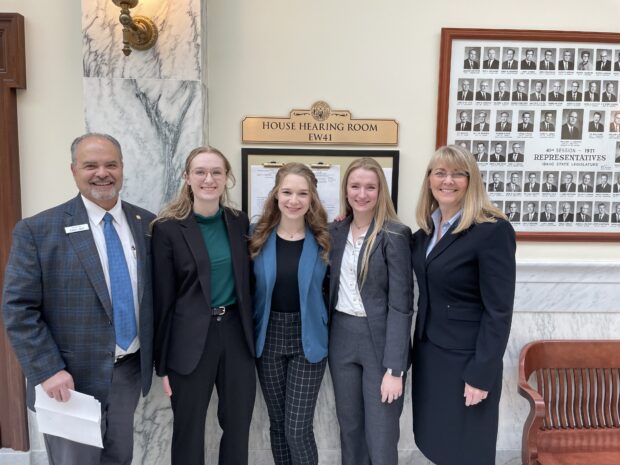House Education Committee members heard presentations on three draft bills Tuesday morning, all with the same goal — to establish education savings accounts.
Each draft would siphon money into accounts for tuition or fees at nonpublic K-12 schools. All presenting lawmakers said they hope to expand school choice in Idaho.
The discussion came after the Senate killed the first ESA bill of the session on the floor Monday afternoon.
House Education took no action Tuesday. Committee Chair Julie Yamamoto, R-Caldwell, said Tuesday’s presentations were designed to help lawmakers prepare for what’s to come. Sponsors will return Thursday for formal print hearings and committee votes.
Idaho EdNews obtained the three drafts Tuesday. Here’s how they line up.
529 Accounts
Rep. Jaron Crane’s draft bill falls under the Idaho College Savings Program, or 529 plan.
Under an expanded version of the program, families of eligible students could apply for an omnibus ESA through the state superintendent’s office. Approved accounts would receive $1,500 annually, until the student graduates from high school, obtains a GED or is older than 21.
The money could be used to pay tuition at nonpublic schools. Eligible institutions would extract the payment from the account directly — beneficiaries would never access the money directly. The accounts would be monitored by the state superintendent, treasurer and controller — what Crane, R-Nampa, touted to the committee as a measure of accountability.
And Crane told the committee the program is unlimited — all eligible Idahoans (K-12 students attending non-public schools) would be able to apply for and establish an account. “There is no limit,” he said.
The draft legislation would not require any additional funding for administrative or startup costs because it falls under an existing program.
Empowering Parents expansion
The second draft also falls under an existing initiative: the Empowering Parents grant program. Empowering Parents disperses micro grants — up to $1,000 per student, or $3,000 per family — for education expenses like textbooks, tutoring or technology.
Brought forward by Rep. Wendy Horman, R-Idaho Falls, and Sen. Lori Den Hartog, R-Meridian, the draft legislation creates an Empowering Parents pilot program that would allow families to receive $6,000 grants for nonpublic school tuition or to hire certified teachers for microschool startups. The money would be administered through the existing online platform used for Empowering Parents.
The program would cap at 2,000 students, and low-income applicants would be prioritized.
The bill carries a maximum $12 million price tag. Den Hartog said she hopes the money would come from Little’s request for $30 million in annual, ongoing Empowering Parents funding. There would be no additional administrative or startup costs.
The ESA component expires after five years.
Personalized student education plans
Rep. Lance Clow, R-Twin Falls, proposes a standalone ESA program.
Qualifying students would receive $6,975 in their accounts — 80% of the SDE-calculated per-student funding for public schools in 2024. The public schools would retain the remaining 20%. Funds would be distributed and monitored on a third-party online platform, and could be put toward private school tuition and fees or other education expenses.
The program would target 2,000 students in its first year, and applicants would be prioritized based on income. Current private school students would not be able to apply — only kindergartners entering the school system for the first time, or public school students hoping to exit the public education system.
Clow estimated the total cost of the program at $17.5 million, but told the committee funding would be at the discretion of the Joint Finance-Appropriations Committee.
Clow’s draft also requires that student beneficiaries take a “nationally normed assessment.” Results would be reported to parents — not the SDE — but parents would need to prove their student is performing at grade level, or has demonstrated academic growth, to re-up funding.
Little’s skeptical reaction
On Tuesday, Gov. Brad Little poured cold water on the idea of using some of the $30 million in ongoing Empowering Parents money for private school tuition.
“This thing is going to be fully subscribed,” Little said during a brief news conference. “In essence, they are taking food out of the mouths of a program that we know is going to work.”
During Tuesday’s news conference, Little rolled out a plan to create a seven-member parent advisory council for the program. Applications will be taken until the end of April. (Details here.)
“We want and need their help to improve and strengthen this program,” Little said.
State Board elections bill spiked
State Board of Education appointments will remain just that — appointments.
The House Education Committee rejected a bill calling for direct, partisan elections to round out the State Board.
House Bill 204 would have created seven regional State Board districts, and would have turned the elected posts into paid positions worth a $12,000 annual stipend. The seven elected board members would have served alongside the state schools superintendent, who would serve as State Board chair.
The bill’s sponsor, Rep. Joe Alfieri, R-Coeur d’Alene, called the bill a matter of fairness. He said the seven elected positions — as opposed to gubernatorial appointments — would bring more ideological balance to the board.
“We need to recognize that there is another side,” he said.
The idea of elected State Board positions isn’t new; it’s part of the Idaho Republican Party platform. Branden Durst, a former legislator and unsuccessful state superintendent’s candidate, pushed for the party platform — but said he first thought of the idea in 2007, when he was a Democrat in the House.
Speaking on behalf of Idaho Freedom Action, Durst said the bill would give each college and university a locally elected advocate. “What’s broken right now is there is no guarantee of regional representation.”
But seven Republicans joined the committee’s three Democrats in voting down the bill.
“Things are working quite nicely for us,” said Rep. Jack Nelsen, R-Jerome, who said the elections would inject campaign money into State Board politics. “It’s not commercialized as much.”
With the committee’s vote, the bill is likely dead for the session.
Gubernatorial appointments run into trouble

A divided Senate Education Committee recommended rejecting one gubernatorial appointment, and remained neutral on another appointment.
Charter commission. The committee said the Senate should reject Karen Echeverria’s appointment to the Idaho Public Charter School Commission. The former head of the Idaho School Boards Association had been appointed to the commission in August, pending Senate confirmation.
Sen. Lori Den Hartog, R-Meridian, led the push to oppose Echeverria’s appointment. While saying Echeverria was “extraordinarily experienced,” and noting the commission’s regulatory and advocacy role, Den Hartog also said Echeverria has not been enough of an advocate for charters.
“It is with reluctance that I do this,” Den Hartog said before the committee vote.
The committee voted 6-3 to recommend rejecting Echeverria’s appointment. Committee Chair Dave Lent, R-Idaho Falls, and Boise Democrats Janie Ward-Engelking and Carrie Semmelroth voted against the motion, after recommending to confirm Echeverria.

The vote on Echeverria’s appointment is unusual, and a break with recent history. Earlier this session, the Senate reappointed board Chairman Alan Reed of Idaho Falls to the commission, without incident.
State Board. Senate Education took no position on reappointing David Hill, a board member since 2014.
Sen. Scott Herndon, R-Sagle, raised two objections. He said he was concerned because Hill had told him he probably wouldn’t complete his full five-year term. And Herndon said Hill was “complicit” in the State Board’s decisions to close schools during the onset of the COVID-19 pandemic, and continues to defend the board’s approach.
“I think the COVID pandemic was especially overblown for school children,” Herndon said.
Senators wrestled with several options on Hill’s appointment.
Sen. Brian Lenney, R-Nampa, wanted the committee to recommend rejecting Hill’s appointment, but no other senator seconded the motion. Sen. Janie Ward-Engelking, D-Boise, wanted the committee to endorse Hill, but her motion never came to a vote.
The entire Senate will have the last word, when both appointments come up for a final vote.
Advanced Opportunities upgrade heads to House floor
Three Rigby High School graduates traveled from their respective college campuses Tuesday morning to urge lawmakers to tweak the Advanced Opportunities program.

And the House Education Committee agreed.
They unanimously approved House Bill 181, which would make two changes. First, it would provide every student a $4,625 line of credit for Advanced Opportunities programs, a $500 increase. Second, students could use all of their Advanced Opportunities money for career-technical education; the law now caps CTE spending at $500 per course, or $1,000 per year.
Two Idaho Falls Republicans, Rep. Wendy Horman and Sen. Dave Lent, began working on changes in the Advanced Opportunities program last summer, after they met the three Rigby graduates.
The three graduates — Montana State University student Paige Smith, University of Idaho student Alyssa Taylor and Brigham Young University-Idaho student Kyree Bowman — are unabashed Advanced Opportunities supporters.
They dedicated their high school senior project to helping get the word out about the program. And they used their Advanced Opportunities money to load up on dual-credit college classes. Taylor and Bowman graduated high school with associate’s degrees; Smith graduated with 45 college credits.
But in an interview after Tuesday’s committee meeting, they said they ran into hiccups. Their high school counselor didn’t advise them to pursue Advanced Opportunities in the first place. They took some classes that didn’t help them toward a degree, cutting into their $4,125 line of credit.
“I had way more credits than I needed for my associate’s degree,” said Taylor. However, she still had to pay the balance for her associate’s degree out of pocket.
House members could vote in the next few days on increasing the Advanced Opportunities cap.
Charter school revolving loan fund heads to House
A $50 million charter school bill is headed to the House, after it passed the Senate unanimously Tuesday morning.
Senate Bill 1043 would establish a revolving loan fund for new charter schools to help finance startup facilities costs. Charter schools do not get startup facilities funding from the state, and cannot float bonds and levies like school districts can. Many charters turn to private partnerships or donations to build or take over existing buildings. Charter schools that take out loans are often hit with high interest rates, according to bill sponsor Sen. Lori Den Hartog, R-Meridian.
The fund would lend four new charter schools per year up to $2.5 million each, for a total of $10 million annually. After the first five years, the $50 million fund would start to pay for itself as borrowers finish paying back their loans.
The bill passed the Senate unanimously, but not without some hesitation from Senate Democrats.
Sens. Janie Ward-Engelking and Melissa Wintrow, both of Boise, said they want to see a commitment from Senate members to pass similar legislation for traditional schools, which have their own facilities needs.
